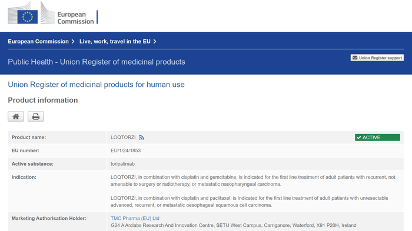Junshi Biosciences’ PD-1 Approved in the EU, Achieving Market Launch in China, the US, and Europe
September 25, 2024
Source: drugdu
 522
522
 As a result, Toripalimab has become the first and only PD-1 approved for the treatment of nasopharyngeal carcinoma in Europe, as well as the only first-line treatment drug for advanced or metastatic esophageal squamous cell carcinoma regardless of PD-L1 expression. Prior to this, Toripalimab had already been approved in China and the US.
As a result, Toripalimab has become the first and only PD-1 approved for the treatment of nasopharyngeal carcinoma in Europe, as well as the only first-line treatment drug for advanced or metastatic esophageal squamous cell carcinoma regardless of PD-L1 expression. Prior to this, Toripalimab had already been approved in China and the US.
On July 28, Junshi Biosciences announced that Toripalimab's marketing authorization application received a positive opinion from the European Medicines Agency's Committee for Medicinal Products for Human Use (CHMP), recommending its approval for the aforementioned indications.
Toripalimab injection (Chinese trade name: Tuoyi®) is the first domestically approved PD-1 monoclonal antibody in China. In December 2018, the National Medical Products Administration conditionally approved Toripalimab for the treatment of unresectable or metastatic melanoma in patients who had failed prior systemic therapy.
As of now, Toripalimab has received approval for seven indications in China, covering the treatment of melanoma, nasopharyngeal carcinoma, upper urinary tract urothelial carcinoma, esophageal squamous cell carcinoma, non-squamous non-small cell lung cancer, and small cell lung cancer. In December 2020, Toripalimab was included in the National Medical Insurance Directory following its first negotiation, making it the only PD-1 monoclonal antibody in the directory for the treatment of melanoma.
Toripalimab exemplifies the active international expansion of domestic biopharmaceutical innovation. By the end of October 2023, Toripalimab (US trade name: LOQTORZI) was approved by the US Food and Drug Administration (FDA) as the first drug for nasopharyngeal carcinoma available in the US. Additionally, it is the first biologic innovative drug from China approved by the FDA.
Currently, in addition to the indication for nasopharyngeal carcinoma, Toripalimab has garnered the FDA's breakthrough therapy designation for mucosal melanoma and soft tissue sarcoma, along with fast track, priority review, and orphan drug status for esophageal cancer and small cell lung cancer.
Beyond the US, Toripalimab is also expanding its international reach to Europe and Australia. In December 2022 and February 2023, marketing authorization applications were submitted to the European Medicines Agency (EMA) and the UK’s Medicines and Healthcare products Regulatory Agency (MHRA) for Toripalimab in combination with cisplatin and gemcitabine for the treatment of locally recurrent or metastatic nasopharyngeal carcinoma, as well as in combination with paclitaxel and cisplatin for advanced or recurrent metastatic esophageal squamous cell carcinoma.
In November 2023, the Australian Therapeutic Goods Administration (TGA) accepted the marketing authorization application for Toripalimab in combination with cisplatin/gemcitabine for the first-line treatment of adult patients with metastatic or recurrent locally advanced nasopharyngeal carcinoma, along with its use as monotherapy for adults with recurrent, unresectable, or metastatic nasopharyngeal carcinoma after previous platinum treatment and disease progression. Toripalimab has also received orphan drug status for the treatment of nasopharyngeal carcinoma in Australia.
To date, Toripalimab has initiated over 40 company-sponsored clinical studies covering more than 15 indications worldwide (including China, the US, Southeast Asia, and Europe). Key ongoing or completed clinical studies include indications for lung cancer, nasopharyngeal carcinoma, esophageal cancer, gastric cancer, bladder cancer, breast cancer, liver cancer, kidney cancer, and skin cancer.
On the commercial front, according to Junshi Biosciences' semi-annual report, the company achieved revenue of 786 million yuan in the first half of the year, representing a year-on-year increase of 17.37%. Of this, the core product Toripalimab generated sales revenue of 671 million yuan in the domestic market, a growth of approximately 50%. However, PD-(L)1 monoclonal antibody products also epitomize the homogenization of domestic drugs, with a total of 20 PD-(L)1 monoclonal antibodies approved so far in China.
Currently, Junshi Biosciences’ commercialized products also include Adalimumab (Junmaikang®), developed in collaboration with Mylan, which is their third commercial product. It was first approved in March 2022 and has since received approval for eight indications, including rheumatoid arthritis, ankylosing spondylitis, psoriasis, Crohn's disease, uveitis, polyarticular juvenile idiopathic arthritis, pediatric plaque psoriasis, and pediatric Crohn's disease.
The international expansion of Toripalimab reflects the ongoing trend of domestic pharmaceuticals entering global markets. In recent years, other drugs achieving simultaneous market approval in the US, China, and Europe include the domestic Trastuzumab biosimilar Hanquyou® (US trade name: HERCESSI, European trade name: Zercepac®), which is the first monoclonal antibody biosimilar approved in all three major markets, and has been approved in 47 countries and regions.
Additionally, BeiGene's key products, the BTK inhibitor Zanubrutinib (Chinese trade name: Baiyueze®, English trade name: BRUKINSA®) and the PD-1 monoclonal antibody Tislelizumab (Chinese trade name: Baize'an®, English trade name: TEVIMBRA®), have also been launched in three regions.
https://finance.eastmoney.com/a/202409243189196063.html
By editorRead more on
- Gan & Lee Pharmaceuticals’ new PROTAC drug GLR2037 tablets have been approved for clinical trials to enter the field of prostate cancer treatment March 3, 2026
- AideaPharmaceuticals plans to raise no more than 1.277 billion yuan through a private placement to focus on the global clinical development of innovative HIV drugs March 3, 2026
- Giant Exits! Its Star Business Acquired March 3, 2026
- Focusing on cardiovascular and cerebrovascular diseases! OpenMediLead Medical Intelligence Dual Engines Launch Internal Testing, Connecting Drug Development and Clinical Diagnosis in a Closed Loop March 3, 2026
- Innovent Biologics Announces Approval of New Indication for BTK Inhibitor “Pitubrutinib” in China March 3, 2026
your submission has already been received.
OK
Subscribe
Please enter a valid Email address!
Submit
The most relevant industry news & insight will be sent to you every two weeks.



